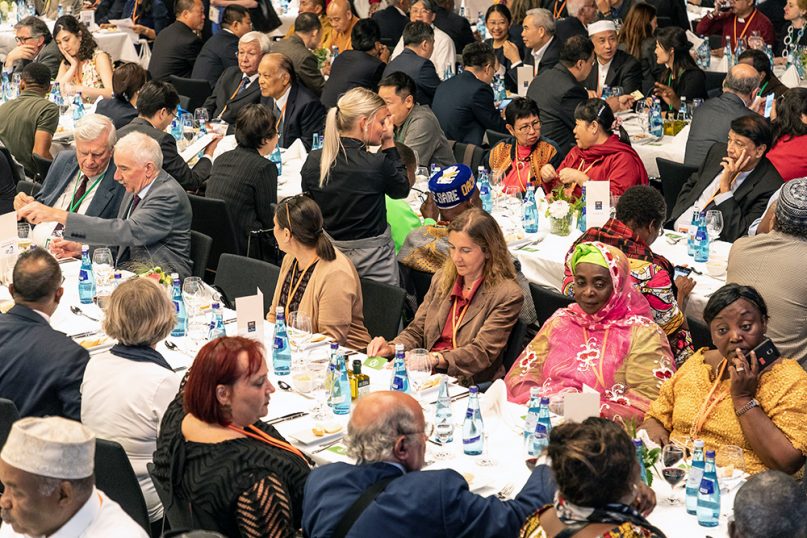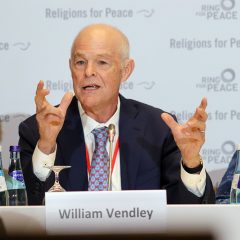LINDAU, Germany (RNS) — The 10th Religions for Peace World Assembly launched Tuesday (Aug. 20) with calls for religious groups to take decisive action on the main geopolitical issues of the day, and ending with an unusual “statement of commitment” aimed at fostering multireligious cooperation.
Almost every religious leader who spoke at the opening ceremony called communities of faith to look beyond their own local or church-related issues.
“Nothing can be accomplished if we work separately,” said Ecumenical Patriarch Bartholomew I of Constantinople.
Kosho Niwano, president-designate of the Japanese Buddhist movement Rissho Kosei-kai, praised interfaith cooperation of the past and said it should continue in the future.
“We have seen half a century of progress so far and for that to continue the only way is for us to work together.”
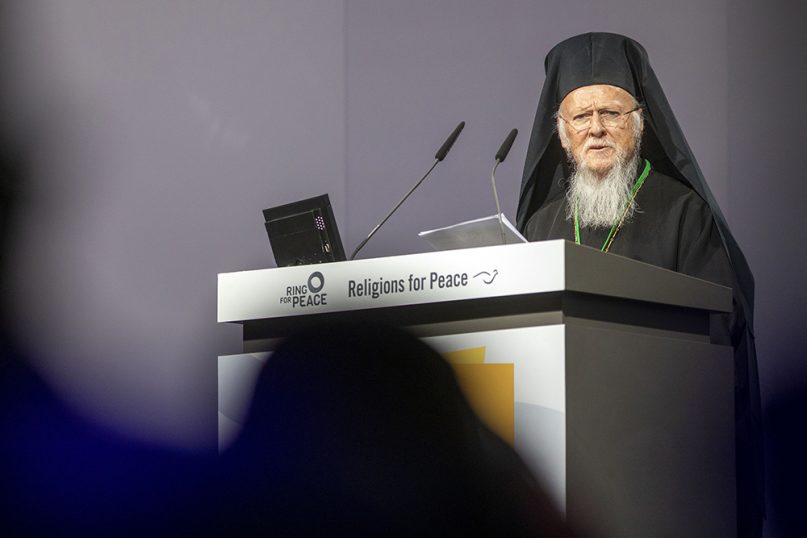
Ecumenical Patriarch Bartholomew I of Constantinople speaks during the opening ceremony of the Religions for Peace 10th World Assembly on Aug. 20, 2019, in Lindau, Germany. Photo by Christian Thiel/Religions for Peace
Cardinal John Onaiyekan, archbishop of Abuja, Nigeria, agreed.
“The future depends entirely on how we address our shared welfare,” he told the more 1,000 attendees at the gathering.
Shaykh Abdallah Bin Bayyah, president of the Forum for Promoting Peace in Muslim Societies, told a parable involving a double-decker ship where the drinking water was stored on the top level.
RELATED: Young activists push interfaith gathering to act on climate change, justice
“The people on the bottom level needed water to drink and so they started to drill a hole in the side of the ship to get the water from the outside,” Bin Bayyah said. “If those on the top level would share their water then everyone would survive. But if they don’t, the ones on the bottom will drill the hole and soon the entire ship will sink and everyone will perish.”
He went on: “It is the same for everyone here,” Bin Bayyah said. “We must work together or we will all fail.”
One key part of the opening day’s activities — the formal presentation of a 25-foot wooden ring-shaped sculpture that will remain in Lindau as a symbol of the assembly — was postponed because of rainy weather.
- The Ring for Peace sculpture at the 10th Religions for Peace conference in Lindau, Germany. Photo by Christian Flemming/Religions for Peace
- Religions for Peace Secretary-General William Vendley on Aug. 20, 2019, in Lindau, Germany. RNS photo by Adelle M. Banks
But the assembly still got underway with plenty of pomp and circumstance along with high ambition for immediate, concrete and near-term results that go beyond interfaith fellowship and sharing of experiences and best practices.
RELATED: German town welcomes hundreds from different faiths for food, worship and unity
Religions for Peace Secretary-General William Vendley on Tuesday noted that religious groups from Peru, Bolivia, Brazil, Congo and Indonesia were meeting on the sidelines of the talks in Lindau to discuss ways to promote stronger action on climate change in their home countries.
“The jungles in those five countries alone account for around 20 percent of the carbon capture the world needs to keep temperature rise to within the goal” of 3.6 degrees Fahrenheit, Vendley told journalists, referring to the formal United Nations goal for temperature change this century compared with pre-industrial levels.
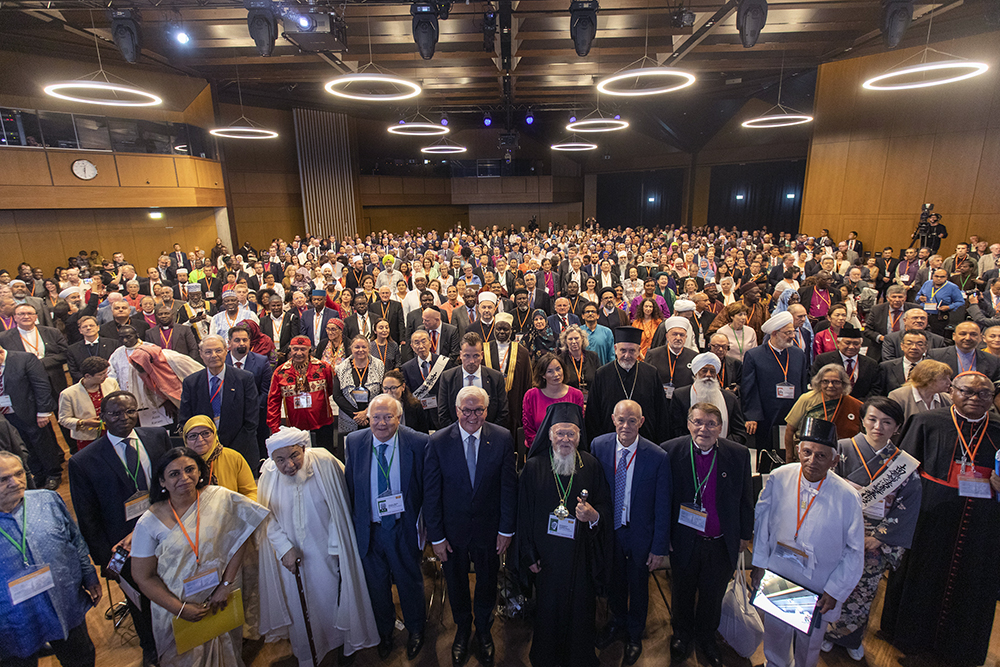
Opening ceremony participants of the Religions for Peace 10th World Assembly on Aug. 20, 2019, in Lindau, Germany. Photo by Christian Thiel/Religions for Peace
At the same briefing, Miguel Ángel Moratinos Cuyaubé, high representative for the United Nations Alliance of Civilizations, said meetings like the ones in Lindau were important to the process of raising the profile of religious groups as part of the solution for global challenges.
“In the 21st century we can say that religion is relevant once again, and this is very important,” he said. “There is a consensus in the world that we must all take steps to save the planet from climate change or conflict. But if we succeed in saving the planet, how will we assure we also save ourselves?”
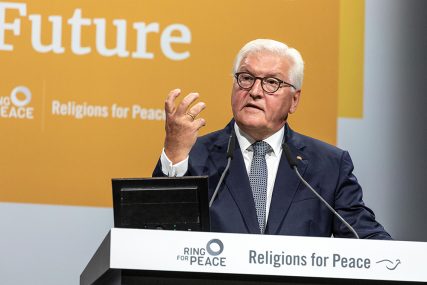
Frank-Walter Steinmeier addresses the opening of the Religions for Peace conference in Lindau, Germany. Photo by Christian Flemming/Religions for Peace
Frank-Walter Steinmeier, federal president from host Germany, was the only nonreligious leader to address the assembly. He called for religious leaders in Lindau to eliminate the role of religion in sparking conflict.
“We must be united in our shared belief that religion must never again be cited as a justification for hatred or violence,” Steinmeier said. “No war must ever again be waged in the name of religion.”
The assembly, which concludes Friday, features discussions on an array of key global issues, such as climate change, terrorism, women’s rights, warfare, poverty, sexual violence and migration.
Vinu Aram, co-moderator of Religions for Peace and director of the Shanti Ashram, led the main assembly of participants from more than 100 countries in a closing “statement of commitment.” She encouraged them to keep the statement in mind while in Lindau as well as after their return home.
“Guided by the principles of my own religious tradition, and respectful of religious differences, I commit myself to principled multi-religious cooperation for peace,” the statement reads. “I will work as a partner with sincere believers of other religions and men and women of goodwill on matters of deeply held and widely shared moral concerns.”
